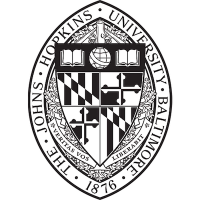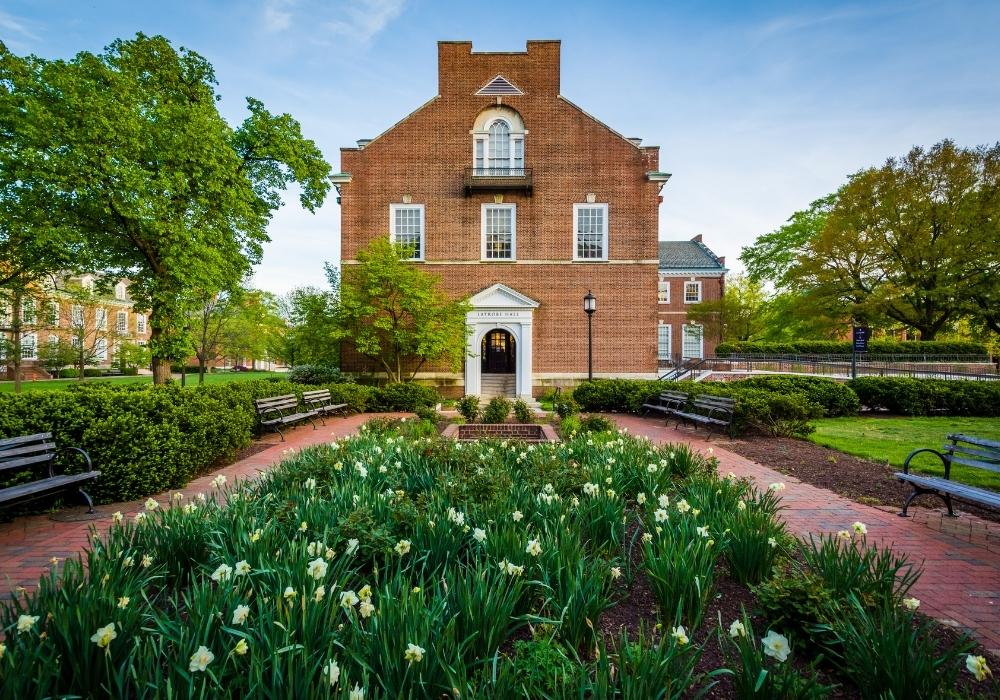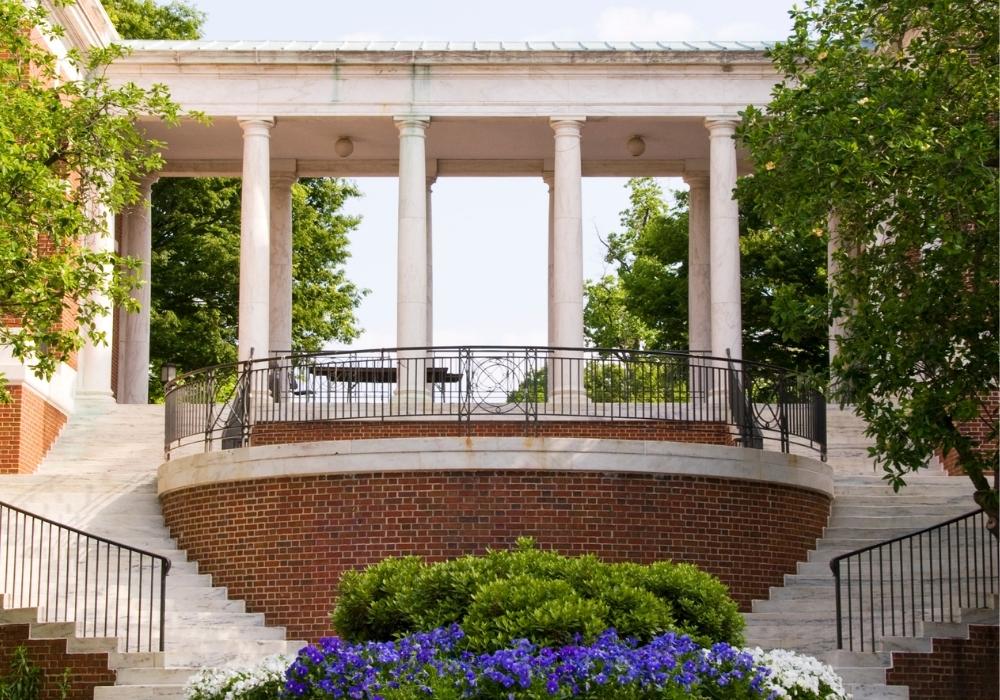The Ivy Scholars guide to Johns Hopkins University’s culture, admissions, and other essential information for prospective students and their families.
Location: Baltimore, Maryland
Mascot: Mr. Commodore
Type: Private Research Institution
Population: 13,000 (6,900 undergrad)

Johns Hopkins was founded in 1876 in Baltimore, Maryland and was named after abolitionist, entrepreneur, and philanthropist Johns Hopkins. It is considered the first research university in the United States and the university motto is “The Truth Shall Set You Free”. The Hopkins’ men’s lacrosse team has won 44 national titles and the university has a particularly strong School of Medicine.

Year Founded: 1876
4 Year Graduation Rate: 87%
Gender Distribution: 52% female, 48% male
Acceptance Rate: 13%
Residency: 40% in state, 49% out of state, 11% international
Location Type: Urban
Schedule System: Semesters
Student/Faculty Ratio: 7:1
Average Class Size: 14
Demographics: 38% Caucasian, 23% Asian, 16% Other, 13% Hispanic, 10% Black
US News Rankings:
Independent Rankings:
Application Deadlines:
Notification Dates:
Acceptance Rates:
Average Applicant Pool: 30,000
Average Number of Applicants Accepted: 2,300
Average Number Enrolled: 1,400
Application Systems: Common App, Coalition App
Average GPA: 3.92 weighted
SAT Scores: 25th% – 1400, 75th% – 1570
ACT Scores: 25th% – 32, 75th% – 34
*Test mandatory. Writing sections are not required.
Demonstrated Interest:
Johns Hopkins does not consider demonstrated interest.
Recommendation Letter Policies:
A school counselor recommendation is required along with evaluations from two teachers who can provide insight into your work.
Johns Hopkins Essay Prompts:
Johns Hopkins Essay Writing Tips
Special Notes:
Transfer:
Admissions Criteria:
The very important aspects of an application in the eyes of JHU are: course rigor, GPA, test scores, recommendations, essay, and character.
The important aspects are: class rank, extracurriculars, and talent.
The aspects they take into account more generally are: first-generation status, volunteering, geographic origin, and ethnicity.
Recruited athletes do not receive much of an admissions boost, given that JHU is Division III, and does not have a major focus on sports.
JHU also no longer offers alumni interviews. While on-campus interviews are offered, it won’t hurt your chances if you don’t complete an interview. JHU does not consider demonstrated interest or financial need. They used to consider legacy status, but recently stated they will no longer do so moving forward.
What is Johns Hopkins Looking For?
All applications are examined using a holistic review. The committee looks for three traits: academic character, impact and initiative, personal contributions. Academic character is how well a student has done academically, as well as their general intellectual potential. Impact and initiative reflects actions both inside and outside the classroom, and how students have been able to apply what they’ve learned. Personal contribution highlights the ways in which students have contributed to their communities, whether within their school or within their town or state more broadly, and how they will contribute to the campus community at Johns Hopkins.
Academic character is judged using the overall rigor of a student’s curriculum and the student’s letters of recommendation, in order to provide context for the student as a scholar. Impact and engagement is judged based on extracurricular involvement, family engagement, and other impactful uses of an applicant’s time.
As JHU considers a student’s fit with the school, they consider the ways in which the student could participate in their broader community. To do so, they review the application in its entirety with an eye to the whole person, and seek out students who are eager to follow their interests using the kinds of opportunities they can offer. The essays are the best way you, as the applicant, can demonstrate that you belong at JHU.
Finally, JHU wants to see real world applications of the lessons you’ve learned in school. The majority of students admitted show a record of practical application and involvement beyond their academic coursework. While purely theoretical learning is appreciated, applying what you have learned is more impressive, and more in line with JHU’s mission as a major research university.
They seek to have 20% of students admitted be eligible for Pell Grants, that is from lower income households. They have increased recruiting of students from these backgrounds, and gone entirely need-blind, along with increasing the financial aid they offer to low-income students.
Johns Hopkins Strategy:
The easiest way to increase your chance of admissions is to apply Early Decision, especially if the school is your first choice. While the overall applicant pool for ED is often more qualified, it is also far smaller, and thus the number of students admitted is relatively greater. While the school does not track demonstrated interest, they do like to see the commitment that applying ED implies.
Applying ED II will provide a minor boost to admissions chances, though less of one than applying ED. If you are unready to apply in the ED round, consider applying ED II if Johns Hopkins is your first choice school.
The essay is very important in the admissions process, and they give examples on their site of ones that worked. Spend enough time on the prompt to make sure you answer it well, and tie it concretely to Johns Hopkins. If the essay reads like it could apply to any school, then admissions officers won’t value it as highly. As a side note, make sure to spell it “Johns Hopkins” and not “John Hopkins” as that shows a lack of care about the school.
The medical program at the school is one of the best in the country, and so they get a large number of highly talented pre-med students. Thus if you are intending to be pre-med, it will be more difficult to stand out and impress. High achieving students in other fields will have an easier time impressing admissions officers with their achievements.
Enter your information below and submit for access to the guide.
Schools:
Core Requirements:
Courses of Study:
AP Credit Policies:

School Motto: The truth will set you free.
Honors Programs:
Research Availability:
Study Abroad:
Business Options:
Pre-Med Options:
Pre-Law Options:
Computer Science Options:
Additional Specialty Programs:
Programs for High Schoolers:

Mission and Values:
Residential Housing System:
Johns Hopkins Residential College System consists of several residence halls that provide a housing experience that foster lifelong friendships. Each hall has its own unique personality. Students not only live there, they create memories through activities offered. Residential Life is a big part of student’s social lives at Johns Hopkins University.
Housing Statistics:
Campus & Surrounding Area:
Transportation:
Traditions:
It is rumored that the institution has no time to do anything but research, and that it has little traditions to speak of. Johns Hopkins Magazine disputes that theory.
Student-Run Organizations:
Sports:
Greek Life:
Nightlife:
Two types of things to do: on campus and off.
On Campus:
Off Campus:

Yearly Cost of Attendance:
Financial Aid:
Johns Hopkins is need-blind for U.S. citizens and permanent residents, and offers financial aid packages that meet 100% of need and do not include student loans. 88% of families with incomes less than $200K receive grants.
The Office of Student Accounts offers a no interest payment plan that allows families to divide semester costs across as many as five equal monthly payments. Participants pay an enrollment fee of $55 per semester. The plans are flexible and accessible online, allowing participants to make adjustments throughout the semester as needed. Approximately 20% of Hopkins undergraduates utilize this adjustable plan. Johns Hopkins has a plethora of student work opportunities that can help subsidize their educational expenses.
Additional Financial Aid & Student Loan Information
Scholarships:
Johns Hopkins has several need based scholarships available for students including the Bloomberg Scholarship and the Hodson-Gilliam Success Scholarship. There are federal and state based grants available based on financial need. There are merit based scholarships available including the Hodson Trust Scholarship. Some merit based scholarships are specific to areas of study such as the Westgate Scholarship in Engineering

Ivy Scholars is the leading educational consultant in Sugar Land, Texas, providing admissions coaching, test prep, and more to help students enroll at top tier schools.

Call us now: +1 (281) 215-5148
.
Get expert tips, admissions updates, and resources delivered straight to your inbox.


